Projecting the Winner of the 2016 Presidential Election: The Personal Electability Index
Related page: “Projecting the Winner of the 2020 Presidential Election: The Personal Electability Index” » http://personality-politics.org/projecting-the-winner-of-the-2020-presidential-election-the-personal-electability-index
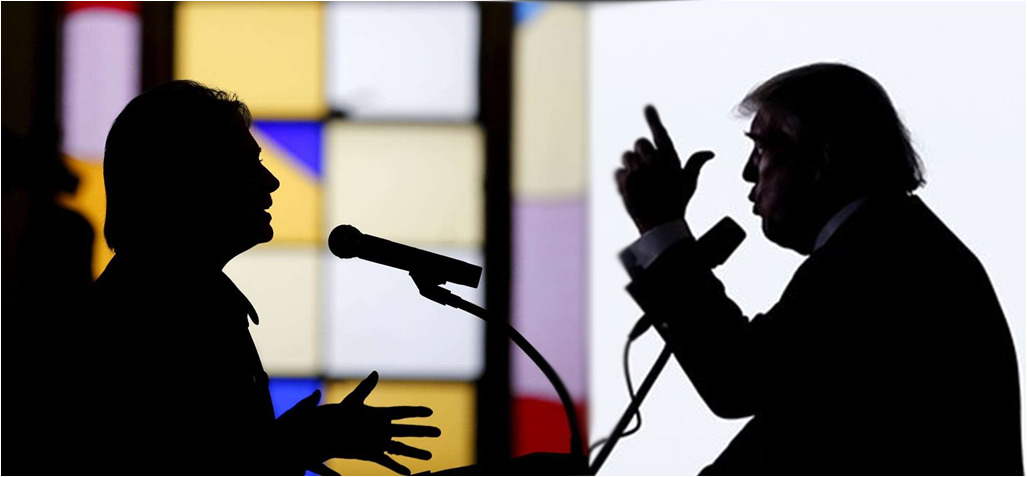
Composite photo credits: Reuters / Carlos Barria; Charlie Neibergall / AP
Projecting the Winner of the 2016 Presidential Election: The Personal Electability Index
February 29, 2016

Research conducted at the Unit for the Study of Personality in Politics under the direction of Aubrey Immelman, Ph.D., is projecting the winner of the 2016 U.S. presidential election.
The Personal Electability Index (PEI) developed at the unit projects that Hillary Clinton, if she wins the Democratic nomination for president, will defeat any Republican candidate with the exception of Donald Trump. If Trump wins the Republican nomination, he is projected to defeat Clinton.
The PEI has accurately predicted, before Super Tuesday, the outcome of every presidential election since 1996.
The PEI heuristic model employs candidate personality traits, as publicly perceived, to predict which contender will resonate most favorably with independent and unaffiliated voters who base their voting choice primarily on the candidate’s personal qualities as publicly displayed rather than on party-political affiliation or allegiance.
The PEI model’s predictive utility in recent presidential election cycles appears to derive from the practically even division of the nation into reliably Republican and Democratic voting blocks, essentially yielding the balance of power to politically independent and unaffiliated voters comprising as much as one-third of the electorate.
Research on the psychology of politics conducted at the USPP reveals that voters respond favorably to candidates who are outgoing (extraverted), self-confident (productively narcissistic), and dominant; and negatively to candidates who are introverted and overly conscientious.
Based on those criteria, candidates studied during the 2016 presidential cycle rank as follows in terms of political impact:
- Donald Trump (PEI = 62; 45 corrected score)
- Hillary Clinton (PEI = 39; 29 corrected score)
- Chris Christie (PEI = 27)
- Mike Huckabee (PEI = 27)
- Ted Cruz (PEI = 25)
- Bernie Sanders (PEI = 18)
- Marco Rubio (PEI = 15)
- John Kasich (PEI = 14)
- Rick Santorum (PEI = 14)
- Ben Carson (PEI = 13)
- Scott Walker (PEI = 8)
- Jeb Bush (PEI = -3)
This election cycle’s projection is issued with the caveat that the predictive validity of the PEI heuristic model is complicated by the unconventional nature of the Trump candidacy, which has defied conventional models of election-outcome forecasting. Specifically, leaders with Trump’s charismatic profile are prone to self-defeating overreach, which raises doubt about Trump’s ability to sustain his popular support through the primaries and the general election campaign.
———————————
Supplementary note
The predictive utility of the Presidential Electability Index underscores the important role of emotion in politics, which was overlooked during a period when the study of human behavior in the social sciences (primarily economics and political science) were dominated by rational choice theory, now increasingly being supplemented by models of bounded rationality and emotion in politics in a quest to be more psychologically plausible without completely abandoning the idea that reason forms the basis for human decision-making processes.
The PEI model does not abandon the notion that voters vote their ideological preferences; roughly 90% of self-identified Democrats and Republicans still vote for their preferred party’s nominee — however, the proportion of voters strongly identifying with a political party has been shrinking, yielding the balance of power to independent and unaffiliated voters who are primed to resonate to a candidate’s personal qualities (personality, likability, etc.) and whose voting behavior in some respects may be more driven by emotion (affect) than by reason (cognition).
Update: Related interest
Real Clear Politics average contemporaneous with February 29 formal release of Presidential Electability Index Trump win prediction
 Click on table for larger image
Click on table for larger image
Click here for latest RCP polls
Unit for the Study of Personality in Politics Releases Psychological Assessments of Hillary Clinton and Donald Trump (Nov. 4, 2016)
Comparison of Hillary Clinton’s and Donald Trump’s Profiles
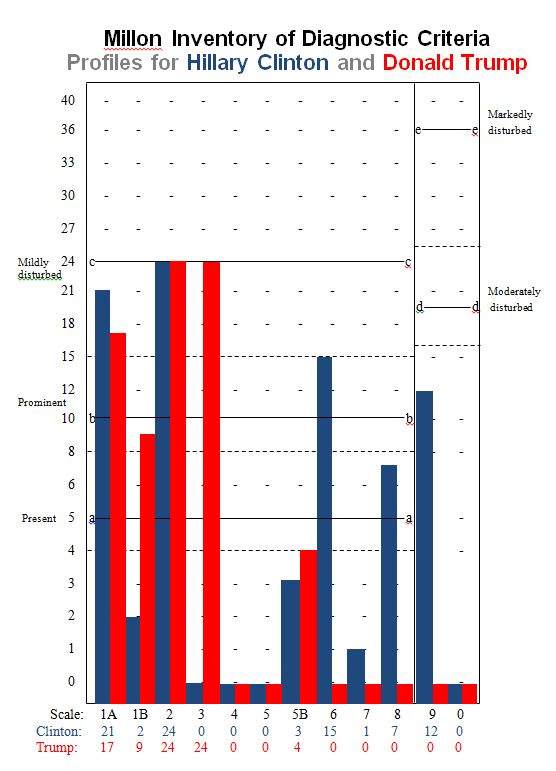
1. Executive Summary: Donald J. Trump
Full text (31 pages)
The Political Personality of 2016 Republican Presidential Nominee Donald J. Trump (Working paper, Unit for the Study of Personality in Politics, St. John’s University/College of St. Benedict, October 2016)
2. Executive Summary: Hillary Clinton
Full text (34 pages)
The Political Personality of 2016 Democratic Presidential Nominee Hillary Clinton (Working paper, Unit for the Study of Personality in Politics, St. John’s University/College of St. Benedict, October 2016)
Detailed Personal Electability Index scores
Following are the scores of candidates studied during the 2016 presidential election cycle on the Millon Inventory of Diagnostic Criteria-based Personal Electability Index, which has accurately predicted the outcome of every presidential election since 1996. [Updated July 27, 2016]
Donald Trump: PEI = 65 (Study 2; 2016)
| Scale: | 1A | 1B | 2 | 3 | 4 | 5A | 5B | 6 | 7 | 8 |
| Score: | 17 | 9 | 24 | 24 | 0 | 0 | 4 | 0 | 0 | 0 |
Scale: 1A = 17; 2 = 24; 3 = 24; 6 = 0; 8 = 0
[Extraversion (scale 3) = 24] + [Narcissism (scale 2) = 24] + [Dominance (scale 1A) = 17] – [Introversion (scale 8) = 0] – [Conscientiousness (scale 6) = 0] = 65 – 0 = 65
Dysfunctionality adjusted
[Extraversion (scale 3) = 15] + [Narcissism (scale 2) = 15] + [Dominance (scale 1A) = 15] – [Introversion (scale 8) = 0] – [Conscientiousness (scale 6) = 0] = 45 – 0 = 45
Donald Trump: PEI = 62 (Study 1; 2015)
| Scale: | 1A | 1B | 2 | 3 | 4 | 5A | 5B | 6 | 7 | 8 |
| Score: | 19 | 11 | 24 | 19 | 1 | 0 | 6 | 2 | 1 | 0 |
Scale: 1A = 19; 2 = 24; 3 =19; 6 = 2; 8 = 0
[Extraversion (scale 3) = 19] + [Narcissism (scale 2) = 24] + [Dominance (scale 1A) = 19] – [Introversion (scale 8) = 0] – [Conscientiousness (scale 6) = (2 – 2) = 0] = 62 – 0 = 62
Donald Trump: PEI = 45 (dysfunctionality adjusted)
| Scale: | 1A | 1B | 2 | 3 | 4 | 5A | 5B | 6 | 7 | 8 |
| Score: | 15 | 11 | 15 | 15 | 1 | 0 | 6 | 2 | 1 | 0 |
Scale: 1A = 15; 2 = 15; 3 =15; 6 = 2; 8 = 0
[Extraversion (scale 3) = 15] + [Narcissism (scale 2) = 15] + [Dominance (scale 1A) = 15] – [Introversion (scale 8) = 0] – [Conscientiousness (scale 6) = (2 – 2) = 0] = 45 – 0 = 45
Hillary Clinton: PEI = 27 (Study 3; 2016)
| Scale: | 1A | 1B | 2 | 3 | 4 | 5A | 5B | 6 | 7 | 8 |
| Score: | 21 | 2 | 24 | 0 | 0 | 0 | 3 | 15 | 1 | 7 |
[Extraversion (scale 3) = 0] + [Narcissism (scale 2) = 24] + [Dominance (scale 1A) = 21] – [Introversion (scale 8) = 7] – [Conscientiousness (scale 6) = (15 – 4) = 11] = 45 – 18 = 27
Dysfunctionality adjusted
[Extraversion (scale 3) = 0] + [Narcissism (scale 2) = 15] + [Dominance (scale 1A) = 15] – [Introversion (scale 8) = 7] – [Conscientiousness (scale 6) = (15 – 4) = 11] = 30 – 18 = 12
Hillary Clinton: PEI = 39 (Study 2; updated)
| Scale: | 1A | 1B | 2 | 3 | 4 | 5A | 5B | 6 | 7 | 8 |
| Score: | 19 | 2 | 21 | 1 | 0 | 0 | 0 | 6 | 0 | 0 |
[Extraversion (scale 3) = 1] + [Narcissism (scale 2) = 21] + [Dominance (scale 1A) = 19] – [Introversion (scale 8) = 0] – [Conscientiousness (scale 6) = (6 – 4) = 2] = 41 – 2 = 39
Hillary Clinton: PEI = 29 (dysfunctionality adjusted)
| Scale: | 1A | 1B | 2 | 3 | 4 | 5A | 5B | 6 | 7 | 8 |
| Score: | 15 | 2 | 15 | 1 | 0 | 0 | 0 | 6 | 0 | 0 |
[Extraversion (scale 3) = 1] + [Narcissism (scale 2) = 15] + [Dominance (scale 1A) = 15] – [Introversion (scale 8) = 0] – [Conscientiousness (scale 6) = (6 – 4) = 2] = 31 – 2 = 29
Hillary Clinton: PEI = 23 (Study 1; 2008)
| Scale: | 1A | 1B | 2 | 3 | 4 | 5A | 5B | 6 | 7 | 8 |
| Score: | 15 | 4 | 15 | 2 | 1 | 0 | 9 | 11 | 0 | 2 |
Clinton: [Extraversion (scale 3) = 2] + [Narcissism (scale 2) = 15] + [Dominance (scale 1A) = 15] – [Introversion (scale 8) = 2] – [Conscientiousness (scale 6) = (11 – 4) = 7] = 32 – 9 = 23
Chris Christie: PEI = 27
| Scale: | 1A | 1B | 2 | 3 | 4 | 5A | 5B | 6 | 7 | 8 |
| Score: | 14 | 6 | 9 | 4 | 0 | 0 | 4 | 2 | 0 | 0 |
Scale: 1A = 14; 2 = 9; 3 = 4; 6 = 2; 8 = 0
[Extraversion (scale 3) = 4] + [Narcissism (scale 2) = 9] + [Dominance (scale 1A) = 14] – [Introversion (scale 8) = 0] – [Conscientiousness (scale 6) = (2 – 2) = 0] = 27 – 0 = 27
Mike Huckabee: PEI = 27
| Scale: | 1A | 1B | 2 | 3 | 4 | 5A | 5B | 6 | 7 | 8 |
| Score: | 12 | 5 | 8 | 7 | 4 | 1 | 3 | 2 | 0 | 0 |
Scale: 1A = 12; 2 = 8; 3 = 7; 6 = 2; 8 = 0
[Extraversion (scale 3) = 7] + [Narcissism (scale 2) = 8] + [Dominance (scale 1A) = 12] – [Introversion (scale 8) = 0] – [Conscientiousness (scale 6) = (2 – 2) = 0] = 27 – 0 = 27
Ted Cruz: PEI = 25
| Scale: | 1A | 1B | 2 | 3 | 4 | 5A | 5B | 6 | 7 | 8 |
| Score: | 13 | 6 | 8 | 4 | 0 | 0 | 4 | 2 | 0 | 0 |
Scale: 1A = 13; 2 = 8; 3 = 4; 6 = 2; 8 = 0
[Extraversion (scale 3) = 4] + [Narcissism (scale 2) = 8] + [Dominance (scale 1A) = 13] – [Introversion (scale 8) = 0] – [Conscientiousness (scale 6) = (2 – 2) = 0] = 25 – 0 = 25
Bernie Sanders: PEI = 18
| Scale: | 1A | 1B | 2 | 3 | 4 | 5A | 5B | 6 | 7 | 8 |
| Score: | 13 | 5 | 6 | 3 | 5 | 0 | 8 | 3 | 0 | 4 |
Scale: 1A = 13; 2 = 6; 3 = 3; 6 = 3; 8 = 4
[Extraversion (scale 3) = 3] + [Narcissism (scale 2) = 6] + [Dominance (scale 1A) = 13] – [Introversion (scale 8) = 4] – [Conscientiousness (scale 6) = (4 – 4) = 0] = 22 – 4 = 18
Marco Rubio: PEI = 15
| Scale: | 1A | 1B | 2 | 3 | 4 | 5A | 5B | 6 | 7 | 8 |
| Score: | 3 | 2 | 7 | 6 | 4 | 1 | 1 | 5 | 0 | 0 |
Scale: 1A = 3; 2 = 7; 3 = 6; 6 = 5; 8 = 0
[Extraversion (scale 3) = 6] + [Narcissism (scale 2) = 7] + [Dominance (scale 1A) = 3] – [Introversion (scale 8) = 0] – [Conscientiousness (scale 6) = (5 – 4) = 1] = 16 – 1 = 15
John Kasich: PEI = 14
| Scale: | 1A | 1B | 2 | 3 | 4 | 5A | 5B | 6 | 7 | 8 |
| Score: | 7 | 3 | 4 | 3 | 5 | 1 | 3 | 2 | 0 | 0 |
Scale: 1A = 7; 2 = 4; 3 = 3; 6 = 2; 8 = 0
[Extraversion (scale 3) = 3] + [Narcissism (scale 2) = 4] + [Dominance (scale 1A) = 7] – [Introversion (scale 8) = 0] – [Conscientiousness (scale 6) = (2 – 2) = 0] = 14 – 0 = 14
Rick Santorum: PEI = 14
| Scale: | 1A | 1B | 2 | 3 | 4 | 5A | 5B | 6 | 7 | 8 |
| Score: | 11 | 2 | 10 | 3 | 3 | 0 | 0 | 14 | 0 | 0 |
Scale: 1A = 11; 2 = 10; 3 = 3; 6 = 14; 8 = 0
[Extraversion (scale 3) = 3] + [Narcissism (scale 2) = 10] + [Dominance (scale 1A) = 11] – [Introversion (scale 8) = 0] – [Conscientiousness (scale 6) = (14 – 4) = 10] = 24 – 10 = 14
Ben Carson: PEI = 13
| Scale: | 1A | 1B | 2 | 3 | 4 | 5A | 5B | 6 | 7 | 8 |
| Score: | 8 | 4 | 7 | 2 | 2 | 0 | 2 | 7 | 2 | 1 |
Scale: 1A = 8; 2 = 7; 3 = 2; 6 = 7; 8 = 1
[Extraversion (scale 3) = 2] + [Narcissism (scale 2) = 7] + [Dominance (scale 1A) = 8] – [Introversion (scale 8) = 1] – [Conscientiousness (scale 6) = (7 – 4) = 3] = 17 – 4 = 13
Scott Walker: PEI = 8
| Scale: | 1A | 1B | 2 | 3 | 4 | 5A | 5B | 6 | 7 | 8 |
| Score: | 10 | 2 | 5 | 2 | 3 | 3 | 2 | 12 | 1 | 1 |
Scale: 1A = 10; 2 = 5; 3 = 2; 6 = 12; 8 = 1
[Extraversion (scale 3) = 2] + [Narcissism (scale 2) = 5] + [Dominance (scale 1A) = 10] – [Introversion (scale 8) = 1] – [Conscientiousness (scale 6) = (12 – 4) = 8] = 17 – 9 = 8
Jeb Bush: PEI = -3
| Scale: | 1A | 1B | 2 | 3 | 4 | 5A | 5B | 6 | 7 | 8 |
| Score: | 9 | 3 | 8 | 1 | 5 | 1 | 5 | 15 | 4 | 10 |
Scale: 1A = 9; 2 = 8; 3 = 1; 6 = 15; 8 = 10
[Extraversion (scale 3) = 1] + [Narcissism (scale 2) = 8] + [Dominance (scale 1A) = 9] – [Introversion (scale 8) = 10] – [Conscientiousness (scale 6) = (15 – 4) = 11] = 18 – 21 = (-)3
PEI Scores for Democratic and Republican Nominees, 1996-2012
For historical context, here are the personality-based electability scores for all major-party nominees since 1996, published before Super Tuesday in presidential election years, with the successful candidate listed first:
- 1996: Bill Clinton 37, Bob Dole 15
- 2000: George W. Bush 31, Al Gore -17
- 2004: George W. Bush 31, John Kerry 9
- 2008: Barack Obama 28, John McCain 26
- 2012: Barack Obama 10, Mitt Romney 6
3/1/2016 Super Tuesday Morning Update
According to a CNN/ORC poll released this morning, both Hillary Clinton and Bernie Sanders would defeat Donald Trump in hypothetical general election matchups. In the poll, Clinton tops Trump 52% to 44% among registered voters, while Sanders beats Trump 55% to 43%.
From the perspective of the political psychology research program at the Unit for the Study of Personality in Politics, the poll has heuristic value because it permits a direct comparison of the relative stability and predictive utility of public opinion polling versus personality-based election-outcome forecasting as represented by the Personal Electability Index.
Donald Trump Overwhelms G.O.P. Rivals from Alabama to Massachusetts (Alexander Burns and Jonathan Martin, New York Times, March 1, 2016) — Donald J. Trump won sweeping victories across the South and in New England on Tuesday, a show of strength in the Republican primary campaign that underscored the breadth of his appeal and helped him begin to amass a wide delegate advantage despite growing resistance to his candidacy among party leaders. … Full report
Five Points to Watch for in a Clinton v. Trump General Election Showdown (Lauren Fox, Talking Points Memo, March 2, 2016) — Like it or not, the Republican Party woke up Wednesday morning to its reality: In the most likely scenario now after Super Tuesday, the party will have to depend on loose cannon, anti-establishment, David Duke-backed Donald Trump to defeat Democratic frontrunner Hillary Clinton in November. … Here is what to watch for in a Clinton-Trump showdown this year. … Full report
In South Carolina, Hillary Clinton Showed How She’ll Run Against Donald Trump (Ezra Klein, Fox News, Feb. 27, 2016) — Up until a few weeks ago, the Clinton campaign didn’t really believe they could be so lucky as to have Trump as the Republican nominee. Marco Rubio has long been the candidate they feared most among Republicans, and the smart money was still that he would win the GOP primary. … Trump is loathed by the left in a way the other Republicans simply aren’t. … Trump, however, isn’t simply loathed among Democrats. He’s also disliked by independents, and he’s controversial even among Republicans. Forty-two percent of independents, and 24 percent of Republicans, have a very unfavorable view of Trump. … Full report
Could Populist Wave Send Trump to the White House? (Annie Linskey, Boston Globe, March 3, 2016) — If Donald Trump fights his way to the Republican nomination, there’s evidence showing he could also ride his populist, outsider wave right onto the lawn at 1600 Pennsylvania Ave. … Trump boosters say they can imagine a Ronald Reagan-type scenario that sweeps through the nation on the backs of white working-class voters who either stay home each year or typically trend Democratic. … The durability of Trump’s appeal has confounded the best Republican minds for six months, and national polls show him within striking distance of Democratic front-runner Hillary Clinton. Strategists warn against underestimating Trump. At the very least, the selection of Trump as the Republican standard bearer could scramble predictions in some traditionally key swing states. … Full report
CSB/SJU Professor Predicts Trump Would Beat Clinton (Kirsti Marohn, St. Cloud Times, March 1, 2016) — A political psychology professor at the College of St. Benedict/St. John’s University said his research predicts that if Hillary Clinton wins the Democratic nomination for president, she will defeat any Republican candidate — except Donald Trump. Aubrey Immelman, who directs the Unit for the Study of Personality in Politics at CSB/SJU, developed a personal electability index to predict likely election winners. Ahead of the Super Tuesday caucuses, Immelman said his model projects that if Trump wins the Republican nomination, he would defeat Clinton. … Full report
The DNC Is About to Coronate Donald Trump (Musa al-Gharbi, The Huffington Post, March 15, 2016) — Donald Trump is going to be the next president of the United States, and he will have the Democratic National Committee to thank for it. … I know, here people are going to say “Look at the polls! They show Hillary winning against Trump!” But there are three big issues here: [P]olling more than six months prior to a race is not terribly predictive in general. … Polls be damned: if Hillary Clinton wins the Democratic nomination, Donald Trump will win the presidency. … Full story
CNN/ORC Poll: Clinton Tops Trump on Presidential Traits (Jennifer Agiesta, CNN, March 24, 2016) — If Hillary Clinton and Donald Trump, the respective front-runners in the race for the Democratic and Republican nominations for president, wind up leading their respective parties into the general, voters nationwide think Clinton would most likely win in the November election, according to a new CNN/ORC Poll. … Full report
This Professor Knows Why You Hate Ted Cruz’s Face (Washingtonian, March 30, 2016) — Neurologist Richard Cytowic doesn’t watch the presidential candidates’ debate like the rest of us. With his deep knowledge of human neural networks, the George Washington University professor is often engaged in deciphering what lies behind facial expressions, hand movements, and torso twists. … We asked Cytowic to examine the top players in the 2016 election cycle to explain how humans read a face. … Read Dr. Cytowic’s analysis at the Washingtonian
Electoral Map Is a Reality Check to Donald Trump’s Bid (Jonathan Martin and Nate Cohn, New York Times, April 2, 2016) — In recent head-to-head polls with one Democrat whom Mr. Trump may face in the fall, Hillary Clinton, he trails in every key state, including Florida and Ohio, despite her soaring unpopularity ratings with swing voters. … Full report
This chart shows just how hard it’s going to be for a Republican to win the White House in 2016 (Chris Cillizza, Washington Post “The Fix,” April 8, 2016) — There are 13 states that have voted for the Republican nominee for president in every election since 1992. Those 13 account for just 102 electoral votes. … Give Donald Trump the 13 states that every GOP nominee since 1992 has won. … And, give him the five states the Republican nominee has claimed in five of the last six elections. And the seven states that have voted for the Republican nominee four times since 1992. Add them all up and you get 219 electoral votes. That means Trump … needs 51 more electoral votes to win. Give Trump Colorado, Florida and Nevada — three of the four swingiest states over the past six presidential races — and he still only gets to 263 [of the 270] electoral votes [needed to win]. … Full report
Click on Cook Political Report image for larger display
5/26/2016 Update
Nate Silver’s 2016 General Election Forecast (June 29, 2016)
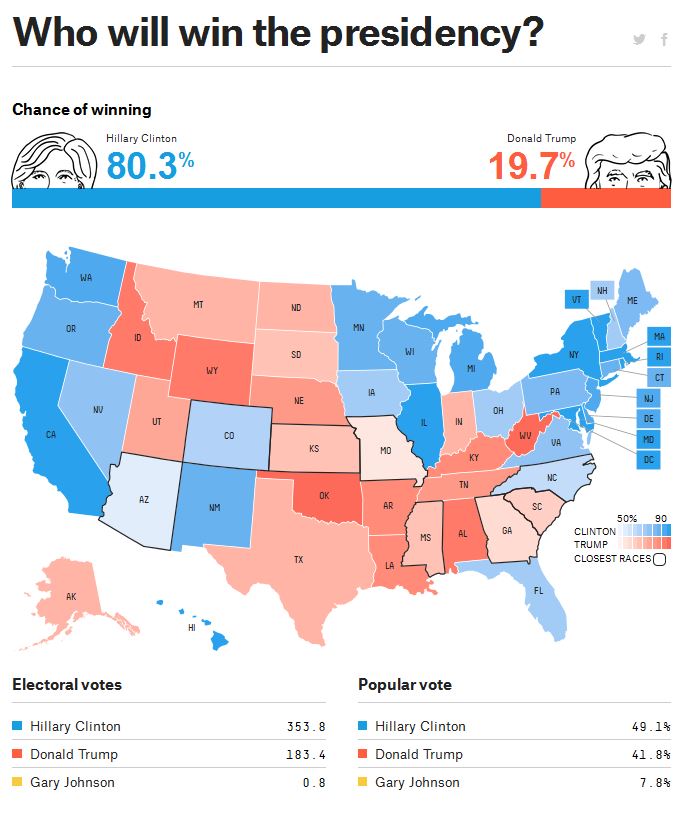
Image: FiveThirtyEight.com
Donald Trump Wins the Republican Nomination for President, Capping an Extraordinary Run
With their families behind them, Republican Presidential nominee Donald Trump and Vice Presidential nominee Mike Pence are cheered on by delegates at the close of the final day of the 2016 Republican National Convention in Cleveland. (Photo credit: Brian van der Brug / Los Angeles Times)
By Noah Bierman and Mark Z. Barabak
![]()
July 19, 2016
Excerpts
Setting aside another day of self-inflicted turmoil, Donald Trump celebrated his formal ascension Tuesday to the Republican presidential nomination — an achievement once seen as highly improbable and not fully assured until the roll call was completed on the second night of the GOP convention. …
The movement to dislodge the nominee, which was largely crushed in a procedural move Monday, was left gasping during Tuesday’s pomp. Many in the crowd booed when Colorado — ground zero for the effort to thwart Trump’s nomination — announced that it had awarded 31 of its 37 delegates to Texas Sen. Ted Cruz.
For all the statements professing party unity, it was clear many of the wounds from the bitter primary season had yet to fully heal.
Full report at the Los Angeles Times
50 G.O.P. Officials Warn Donald Trump Would Put Nation’s Security ‘at Risk’
By David E. Sanger and Maggie Haberman
![]()
August 8, 2016
Excerpts
Fifty of the nation’s most senior Republican national security officials, many of them former top aides or cabinet members for President George W. Bush, have signed a letter declaring that Donald J. Trump “lacks the character, values and experience” to be president and “would put at risk our country’s national security and well-being.”
Mr. Trump, the officials warn, “would be the most reckless president in American history.”
The letter says Mr. Trump would weaken the United States’ moral authority and questions his knowledge of and belief in the Constitution. It says he has “demonstrated repeatedly that he has little understanding” of the nation’s “vital national interests, its complex diplomatic challenges, its indispensable alliances and the democratic values” on which American policy should be based. And it laments that “Mr. Trump has shown no interest in educating himself.”
“None of us will vote for Donald Trump,” the letter states, though it notes later that many Americans “have doubts about Hillary Clinton, as do many of us.” …
Late Monday, Mr. Trump struck back. The signatories of the letter, he said in a statement, were “the ones the American people should look to for answers on why the world is a mess, and we thank them for coming forward so everyone in the country knows who deserves the blame for making the world such a dangerous place.” He dismissed them as “nothing more than the failed Washington elite looking to hold onto their power.”
Mr. Trump correctly identified many of the signatories as the architects of the invasion of Iraq and its aftermath. But he also blamed them for allowing Americans “to die in Benghazi” and for permitting “the rise of ISIS” — referring to the 2012 attacks on the American mission in Libya and the spread of the Islamic State, both of which occurred during the Obama administration. At the time, most of Mr. Trump’s Republican foreign policy critics were in think tanks, private consultancies or law firms, or signed on as advisers to the Republican hopefuls Mr. Trump beat in the primaries.
Among the most prominent signatories are Michael V. Hayden, a former director of both the C.I.A. and the National Security Agency; John D. Negroponte, who served as the first director of national intelligence and then deputy secretary of state; and Robert B. Zoellick, another former deputy secretary of state, United States trade representive and, until 2012, president of the World Bank. Two former secretaries of Homeland Security, Tom Ridge and Michael Chertoff, also signed, as did Eric S. Edelman, who was Vice President Dick Cheney’s national security adviser and as a top aide to Robert M. Gates when he was secretary of defense. …
Missing from the signatories are any of the living Republican former secretaries of state: Henry A. Kissinger, George P. Shultz, James A. Baker III, Colin L. Powell and Condoleezza Rice. …
Yet perhaps most striking about the letter is the degree to which it echoes Mrs. Clinton’s main argument about her rival: that his temperament makes him unsuitable for the job, and that he should not be entrusted with the control of nuclear weapons.
“He is unable or unwilling to separate truth from falsehood,” the letter says. “He does not encourage conflicting views. He lacks self-control and acts impetuously. He cannot tolerate personal criticism. He has alarmed our closest allies with his erratic behavior. All of these are dangerous qualities in an individual who aspires to be president and commander in chief, with command of the U.S. nuclear arsenal.” …
Full report at the New York Times
8/14/2016 Update
On August 11, Politico reported that more than 70 Republicans signed an open letter to Republican National Committee Chairman Reince Priebus urging him to stop spending any money to help Donald Trump win in November and shift those contributions to Senate and House races.
Trump’s GOP Troubles (Smerconish, CNN, Aug. 13, 2016)– Trump campaign adviser and pollster Kellyanne Conway faces off with former congressman Tom Coleman who signed the anti-Trump letter sent to the RNC. (Duration: 7:58)
Commentary
 The Personal Electability Index (PEI) model’s predictive utility derives from the practically even division of the nation into reliably Republican and Democratic voting blocks, essentially yielding the balance of power to politically independent and unaffiliated voters comprising as much as one-third of the electorate.
The Personal Electability Index (PEI) model’s predictive utility derives from the practically even division of the nation into reliably Republican and Democratic voting blocks, essentially yielding the balance of power to politically independent and unaffiliated voters comprising as much as one-third of the electorate.
Stated differently, the model assumes that the vast majority (roughly 90%) of registered and self-identified Republicans will vote for the Republican nominee and a similar proportion of Democrats for the Democratic nominee.
Failure of the party to unite behind their nominee — as currently appears to be the case with the GOP — violates the core assumption of the model and invalidates its predictive utility.
8/19/2016 Update
‘Rally effect’ convinces Trump to deny Clinton lead seen in polls (The Rachel Maddow Show, MSNBC, Aug. 18, 2016) — Larry Sabato, director of the Center for Politics at the University of Virginia, talks with Rachel Maddow about the remarkable lead polls show Hillary Clinton has over Donald Trump, and the “rally effect” that has Trump and his supporters convinced the polls are wrong. (Duration: 9:01; Larry Sabato projecting Clinton landslide of 348-190 Electoral College votes starts at 2:02)
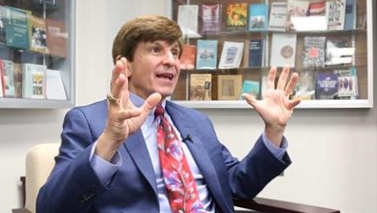
Allan Lichtman (Photo credit: The Washington Post)
By Peter W. Stevenson
![]()
September 23, 2016
Excerpts
Nobody knows for certain who will win on Nov. 8 — but one man is pretty sure: Professor Allan Lichtman, who has correctly predicted the winner of the popular vote in every presidential election since 1984.
When we sat down in May, he explained how he comes to a decision. Lichtman’s prediction isn’t based on horse-race polls, shifting demographics or his own political opinions. Rather, he uses a system of true/false statements he calls the “Keys to the White House” to determine his predicted winner.
And this year, he says, Donald Trump is the favorite to win.
The keys, which are explained in depth in Lichtman’s book “Predicting the Next President: The Keys to the White House 2016” are:
- Party Mandate: After the midterm elections, the incumbent party holds more seats in the U.S. House of Representatives than after the previous midterm elections.
- Contest: There is no serious contest for the incumbent party nomination.
- Incumbency: The incumbent party candidate is the sitting president.
- Third party: There is no significant third party or independent campaign.
- Short-term economy: The economy is not in recession during the election campaign.
- Long-term economy: Real per capita economic growth during the term equals or exceeds mean growth during the previous two terms.
- Policy change: The incumbent administration effects major changes in national policy.
- Social unrest: There is no sustained social unrest during the term.
- Scandal: The incumbent administration is untainted by major scandal.
- Foreign/military failure: The incumbent administration suffers no major failure in foreign or military affairs.
- Foreign/military success: The incumbent administration achieves a major success in foreign or military affairs.
- Incumbent charisma: The incumbent party candidate is charismatic or a national hero.
- Challenger charisma: The challenging party candidate is not charismatic or a national hero.
… The keys are 13 true/false questions, where an answer of “true” always favors the reelection of the party holding the White House, in this case the Democrats. And the keys are phrased to reflect the basic theory that elections are primarily judgments on the performance of the party holding the White House. And if six or more of the 13 keys are false — that is, they go against the party in power — they lose. If fewer than six are false, the party in power gets four more years. …
Full report at the Washington Post
Donald Trump’s Chances of Winning are Approaching Zero
By Chris Cillizza and Aaron Blake
The Fix blog
![]()
October 24, 2016
Excerpts
The election is in 15 days. And the electoral map just keeps looking grimmer and grimmer for Donald Trump.
We are making three changes to The Fix map this week, all favoring Hillary Clinton. …
Clinton now has 323 electoral votes either solidly for her or leaning her way. Trump has just 180. (Reminder: You need 270 to win.) And, virtually all of the vulnerability from here until Nov. 8 is on Trump’s side. …
Everywhere you look, Trump is underperforming where Mitt Romney was at this point in 2012. And Romney only got 206 electoral votes and lost by 5 million or so in the popular vote. …
Full report at the Washington Post
Nate Silver’s 2016 General Election Forecast (October 26, 2016)
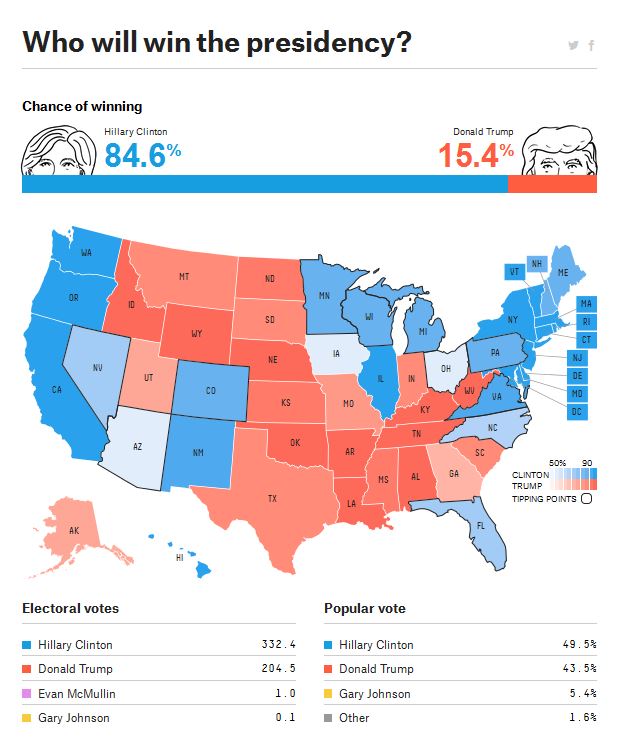
Image: FiveThirtyEight.com
Michael Moore Explains Why Donald Trump Will Win (4:30)
According to Snopes.com, the speech excerpt has been taken by many viewers to suggest that Michael Moore is endorsing Donald Trump’s for president, but that is not the case. The excerpt is from Moore’s new documentary TrumpLand, “which features the director laying out some of the reasons why Americans, especially those residing in the Midwest, might be inclined to vote for Republican presidential candidate Donald Trump. However, the audio is incomplete and has been stripped of a major portion that changes both the tone and the meaning of Moore’s speech.” Immediately after the excerpted clip ends, Moore goes on to say that Trump voters, like Brexit voters, will soon regret their decision.
October 2015 – thanks Chris Wallace @FoxNewsSunday! https://t.co/VEsgPcWq7z
— Donald J. Trump (@realDonaldTrump) December 10, 2016
2016 Election Oracles: These People Predicted Trump Would Win
By Jessica McBride
Heavy
November 12, 2016
Meet the election oracles … they predicted Donald Trump’s rise. They’re mostly professors, although two pollsters also got it right, and one media personality (Michael Moore). Some are economics researchers.
The lofty, slick, and respected forecasting sites – The New York Times’ Upshot, Nate Silver’s FiveThirtyEight – got it wrong, overwhelmingly prognosticating that Hillary Clinton would win the election (although Silver was closer than others). The Upshot thought Clinton had an 85% chance, and most of the pundits and pollsters generally agreed. …
However, not everyone got it wrong. Some professors and pollsters proved to be election day oracles. Many of them report being ridiculed, insulted, and labeled as crazy – until the actual results came in, that is. …
Presidential Electability Index Predicted Donald Trump Win
Local Professor Predicted Trump’s Win

College of St. Benedict/St. John’s University professor Aubrey Immelman, who predicted Donald Trump would win over Hillary Clinton based on their personality profiles, shown Wednesday, Nov. 16, 2016. Immelman has predicted presidential winners correctly for the past 20 years. (Photo: Jason Wachter / St. Cloud Times)
By Kirsti Marohn
St. Cloud Times
November 19, 2016
Pollsters almost universally were wrong about the outcome of the 2016 election, but one local political psychology professor accurately predicted as early as March that Donald Trump would win the presidency.
Aubrey Immelman, who directs the Unit for the Study of Personality in Politics at the College of St. Benedict/St. John’s University, developed a model that uses a candidate’s personality traits to determine how electable they are. Immelman’s model has accurately predicted the winner of the last six presidential elections.
What’s surprising is that Immelman picked Trump last spring as the only candidate from the crowded field of Republican contenders who could beat Hillary Clinton. The St. Cloud Times published a story in March about Immelman’s findings, which even he wasn’t sure he believed.
“Considering what the polls were saying and just looking at how volatile, even unpredictable Trump was, I thought, ‘Well, maybe this time I’ll be wrong,’ ” Immelman said.
When Immelman and his research students first met in June 2015 to decide which candidates to profile, they picked five Republicans they thought were the most viable, including Jeb Bush, Ted Cruz and Marco Rubio. On a whim, Immelman suggested including the New York real estate mogul whose presidential bid seemed like a long shot.
“I said, ‘Hey, why don’t we do Trump?’ ” Immelman recalled. “We all laughed. I laughed the hardest.”
Immelman’s model uses candidates’ personality traits to predict which contender will resonate most favorably with independent voters, who make up roughly one-third of the electorate and frequently base their choice primarily on a candidate’s personal qualities rather than party allegiance.
The model looks at some key personality traits that voters respond positively to during campaigns, including whether a candidate is introverted or extroverted and how narcissistic, dominant and conscientious they are.
Trump and Clinton scored equally high on narcissism, while Clinton scored slightly higher on dominance than Trump, Immelman said.
However, while Trump scored very high as an extrovert, Clinton is far more introverted, Immelman said. Introverted candidates — past examples include Al Gore and Jeb Bush — have more difficulty interacting with people on the campaign trail.
And Clinton is highly conscientious, but Trump scored close to zero, Immelman said. While conscientiousness might be an admirable trait in a president, it’s not always an attractive feature in a candidate.
“She’s very prepared and programmed, and very prudent and cautious,” he said.
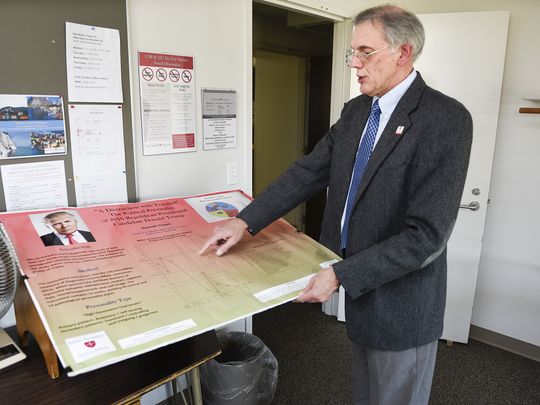
College of St. Benedict/St. John’s University professor Aubrey Immelman describes his personality profile of Donald Trump Wednesday, Nov. 16, at CSB. (Photo: Jason Wachter / St. Cloud Times)
Immelman wasn’t sure about his findings. His model assumes that all the candidates are vetted politicians who have served in Congress or as governor. He wondered how it might be affected by Trump’s unconventional background.
“It turned out it was pretty robust, which makes it a pretty powerful predictor, I think,” he said.
Although most major polls inaccurately predicted a Clinton win, Immelman notes that he wasn’t the only academic who used social science models to get it right. He points to Allan Lichtman, a political historian at American University, and Helmut Norpoth, political science professor at Stony Brook University, who both projected a Trump victory.
Immelman calls his model simplistic, and said he’s never even considered it scientifically significant enough to have it reviewed by peers. He acknowledges that many factors, not just personality, played a role in Trump’s win.
“It’s not the only factor that played a role,” Immelman said. “But I think it played a stronger than normal role, and there’s no way that the polls can account for personality variables.”
Immelman notes that his model only predicts the ability of a candidate to get elected, not how well they will do in office.
“When it comes to governing, actually, I don’t think it predicts success,” he said.
Clinton’s Popular Vote Win Came Entirely from California
By John Merline
Investor’s Business Daily
December 16, 2016
Excerpted
Hillary Clinton’s lead in the popular vote has topped 2.8 million, giving her a 48% share of the vote compared with Trumps 46%. …
[W]hile Clinton’s overall margin looks large and impressive, it is due to Clinton’s huge margin of victory in one state — California — where she got a whopping 4.3 million more votes than Trump.
California is the only state, in fact, where Clinton’s margin of victory was bigger than President Obama’s in 2012 — 61.5% vs. Obama’s 60%.
But California is the exception that proves the true genius of the Electoral College — which was designed to prevent regional candidates from dominating national elections.
In recent years, California has been turning into what amounts to a one-party state. Between 2008 and 2016, the number of Californian’s who registered as Democrats climbed by 1.1 million, while the number of registered Republicans dropped by almost 400,000. …
If you take California out of the popular vote equation, Trump wins the rest of the country by 1.4 million votes. And if California voted like every other Democratic state — where Clinton averaged 53.5% wins — Clinton and Trump end up in a virtual popular vote tie. (This was not the case in 2012. Obama beat Romney by 2 million votes that year, not counting California.)
Meanwhile, if you look at every other measure, Trump was the clear and decisive winner in this election.
***
Number of states won:
Trump: 30
Clinton: 20
_________________
Trump: +10
Number of electoral votes won:
Trump: 306
Clinton: 232
_________________
Trump: + 68
Average margin of victory in winning states:
Trump: 56%
Clinton: 53.5%
_________________
Trump: + 2.5 points
Popular vote total:
Trump: 62,958,211
Clinton: 65,818,318
_________________
Clinton: + 2.8 million
Popular vote total outside California:
Trump: 58,474,401
Clinton: 57,064,530
_________________
Trump: + 1.4 million
Related colloquium
Personality and Leadership Profiles of 2016 Presidential Candidates Hillary Clinton and Donald Trump. Forum presentation by Aubrey Immelman, November 3, 2016. Forum Lectures, 163. Retrieved from Digital Commons website: http://digitalcommons.csbsju.edu/forum_lectures/163/
Related reports on this site
Clinton vs. Trump: Predicting the 2016 Presidential Election Results (Nov. 8, 2016)
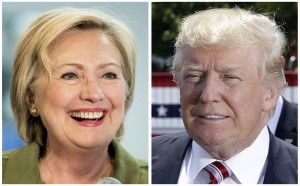
Hillary Clinton and Donald Trump (Photo credit: AP)
The Presidential Electability Index of the Unit for the Study of Personality in Politics projected in August 2015 that Donald Trump would win the Republican primary and go on to beat Hillary Clinton in the 2016 presidential election.
PEI projections for Hillary Clinton and Donald Trump formally released February 29, 2016:
Donald Trump (PEI = 62; 45 corrected score)
Hillary Clinton (PEI = 39; 29 corrected score)
The Personality Profile of 2016 Republican Presidential Candidate Donald Trump (Aug. 2016 updated PEI = 65)
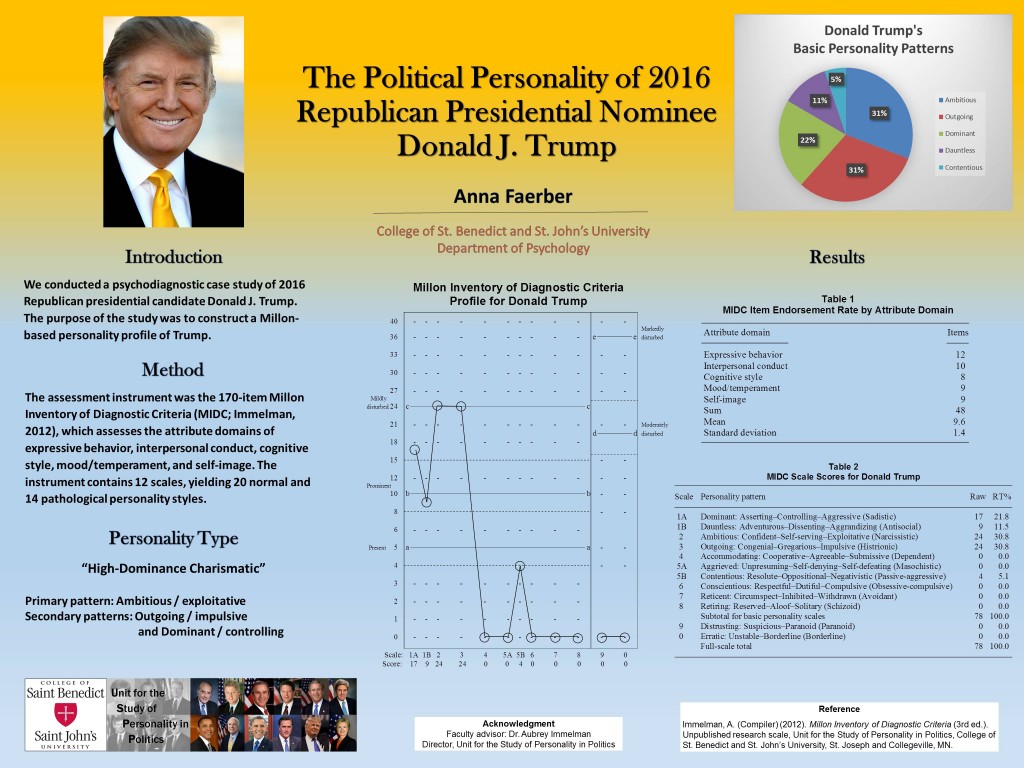
Click on image for larger view
The Personality Profile of 2016 Democratic Presidential Candidate Hillary Clinton (Aug. 2016 updated PEI = 27)
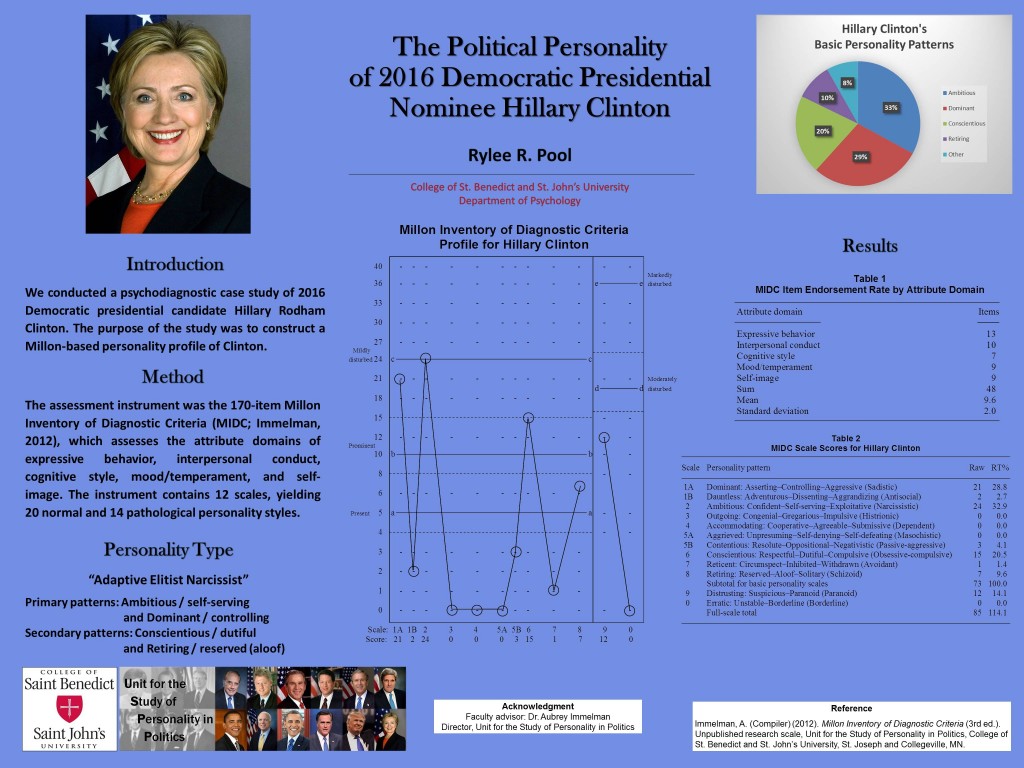
Click on image for larger view
The Personality Profile of 2016 Republican Presidential Candidate Chris Christie (PEI = 27)
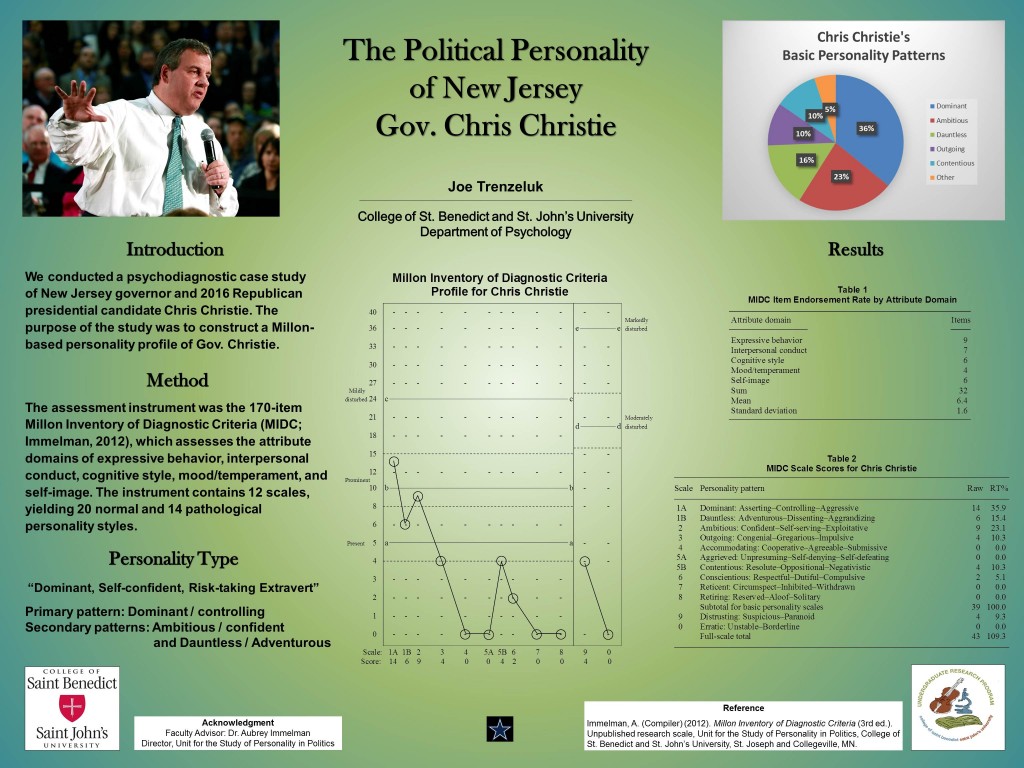
Click on image for larger view
The Personality Profile of 2016 Republican Presidential Candidate Mike Huckabee (PEI = 27)
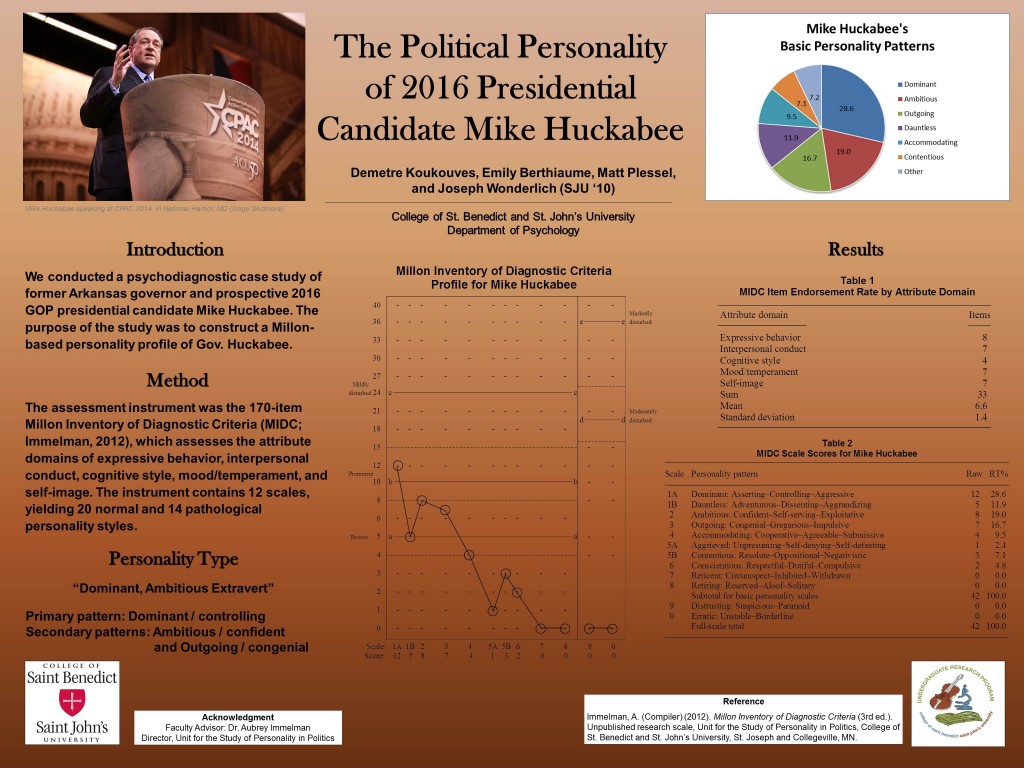
Click on image for larger view
The Personality Profile of 2016 Republican Presidential Candidate Ted Cruz (PEI = 25)
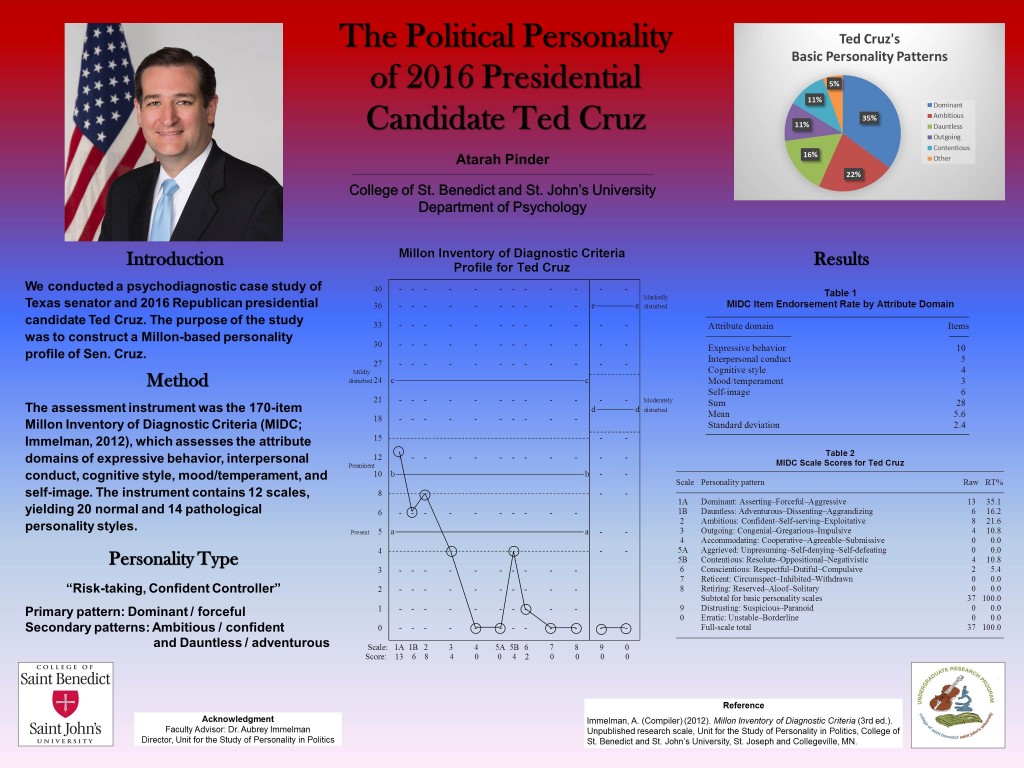
Click on image for larger view
The Personality Profile of 2016 Democratic Presidential Candidate Bernie Sanders (PEI = 18)
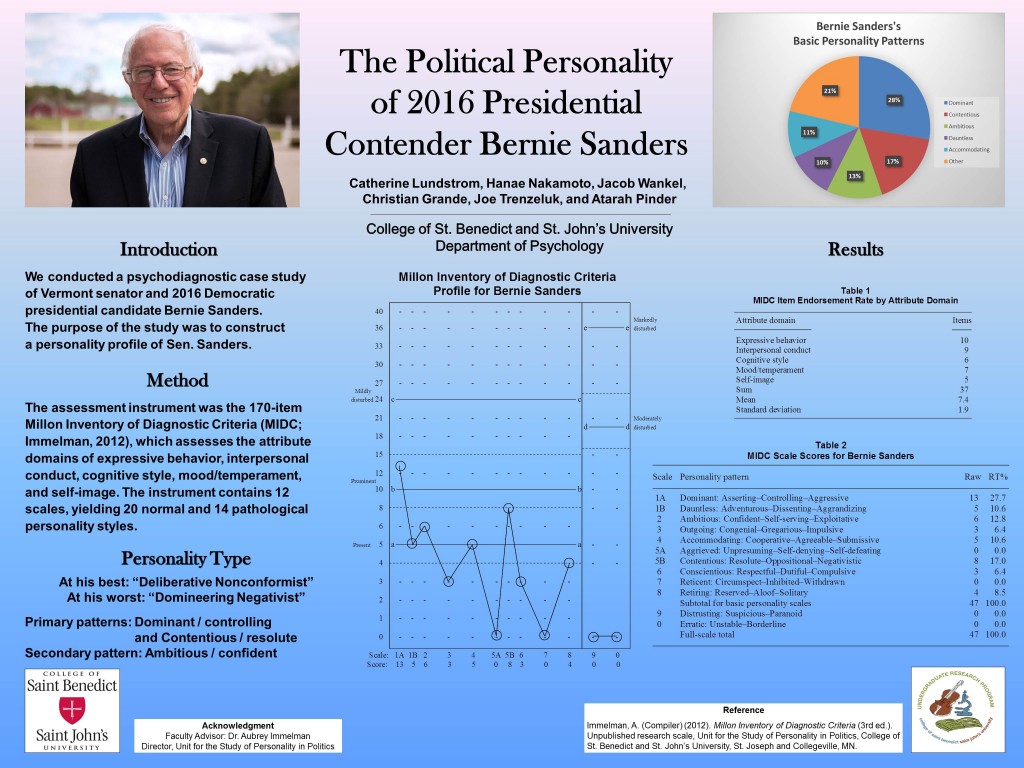
Click on image for larger view
The Personality Profile of 2016 Republican Presidential Candidate Marco Rubio (PEI = 15)
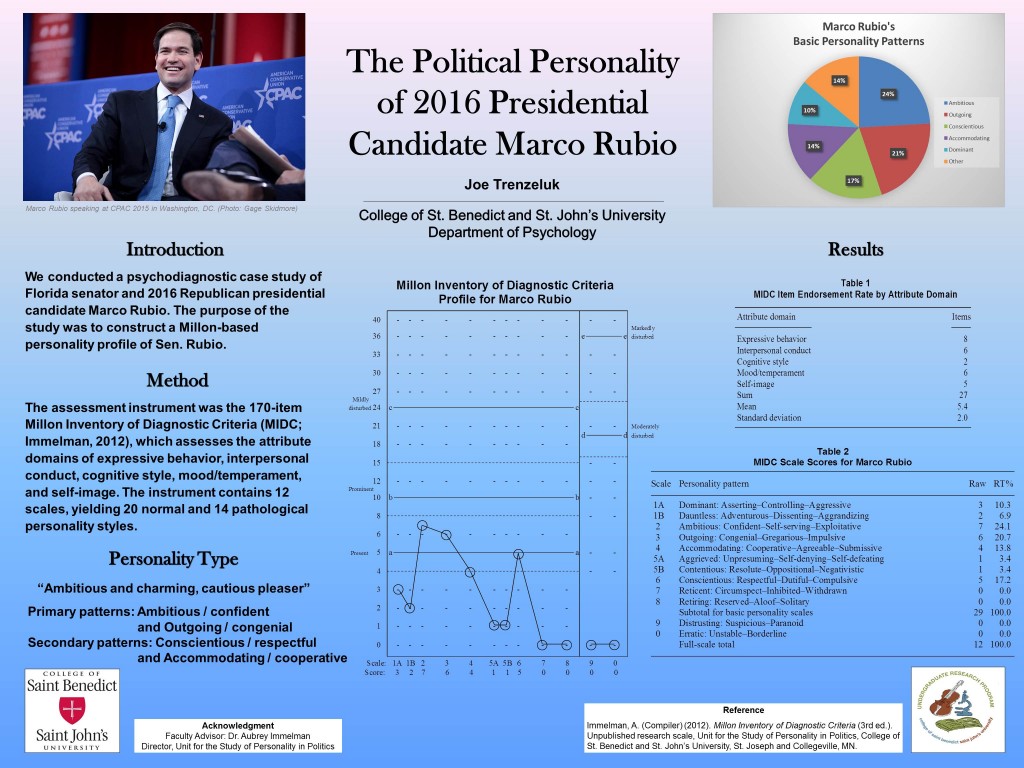
Click on image for larger view
The Personality Profile of 2016 Republican Presidential Candidate John Kasich (PEI = 14)
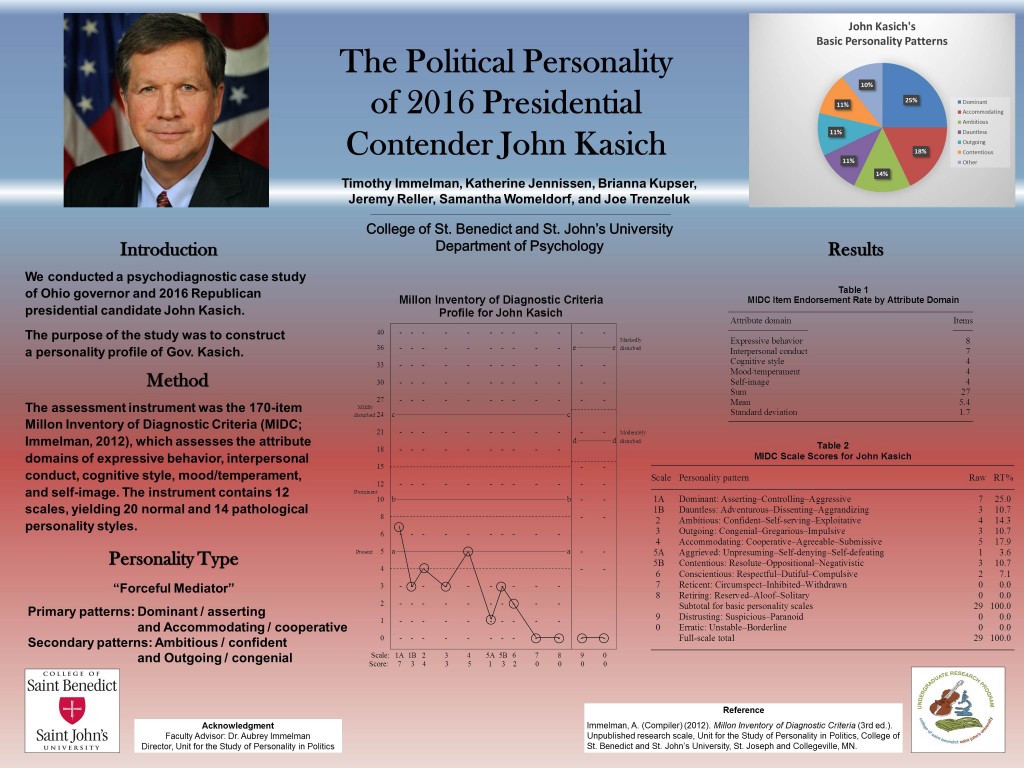
Click on image for larger view
The Personality Profile of 2016 Republican Presidential Candidate Rick Santorum (PEI = 14)
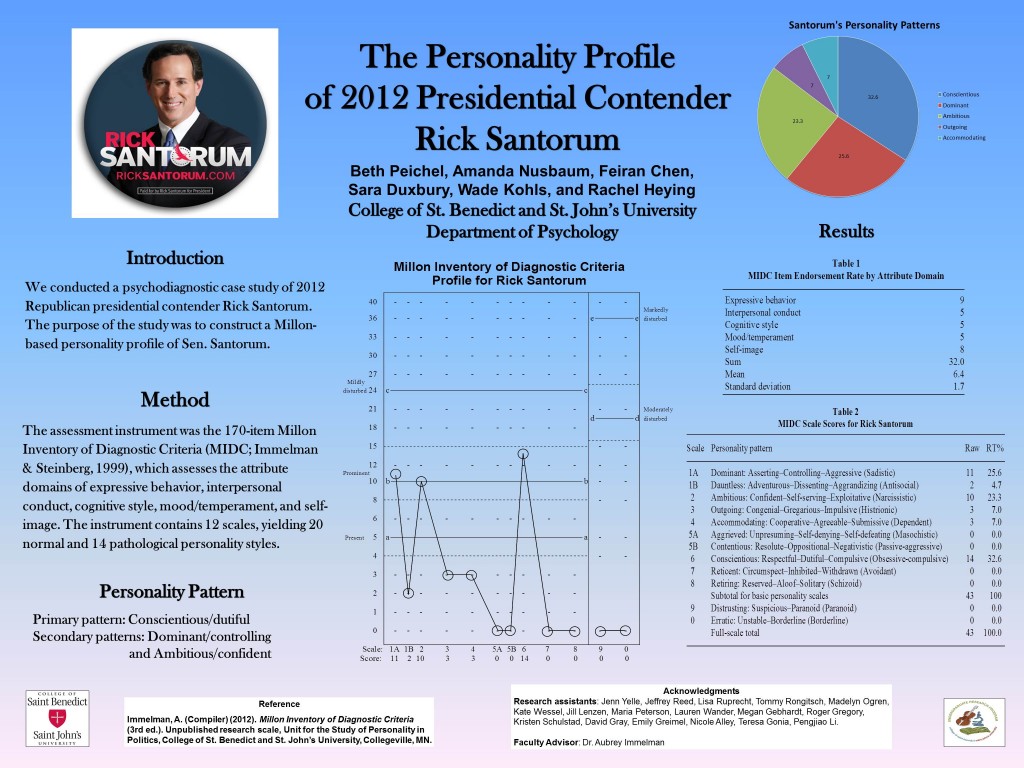
Click on image for larger view
The Personality Profile of 2016 Republican Presidential Candidate Ben Carson (PEI = 13)
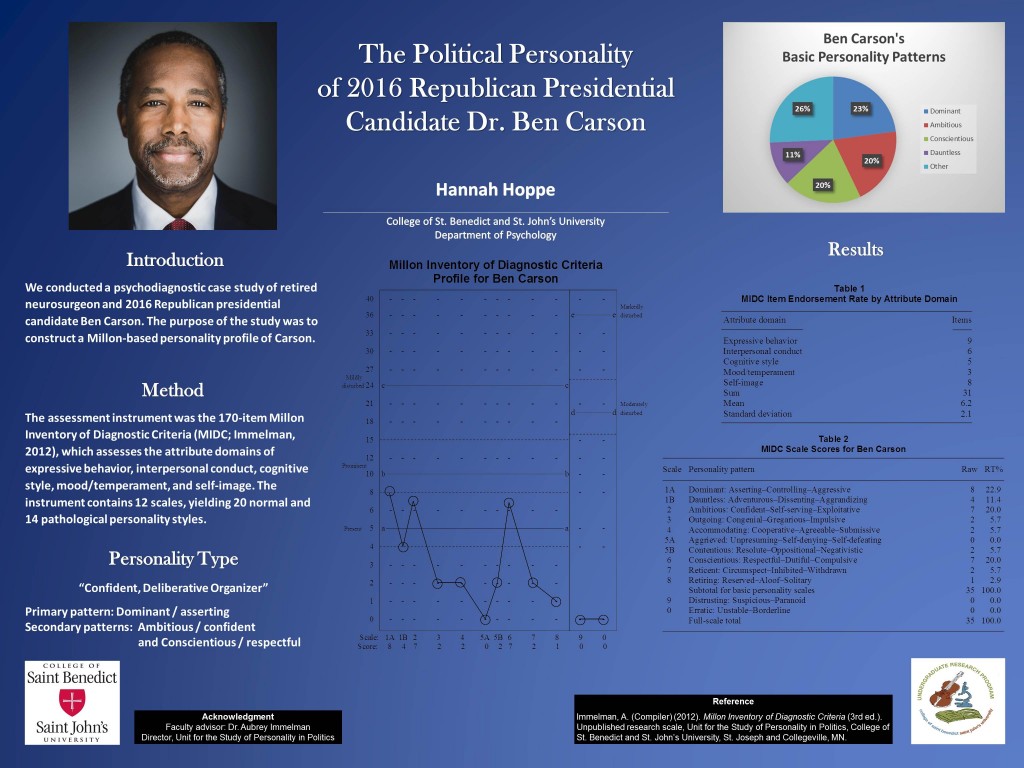
Click on image for larger view
The Personality Profile of 2016 Republican Presidential Candidate Scott Walker (PEI = 8)
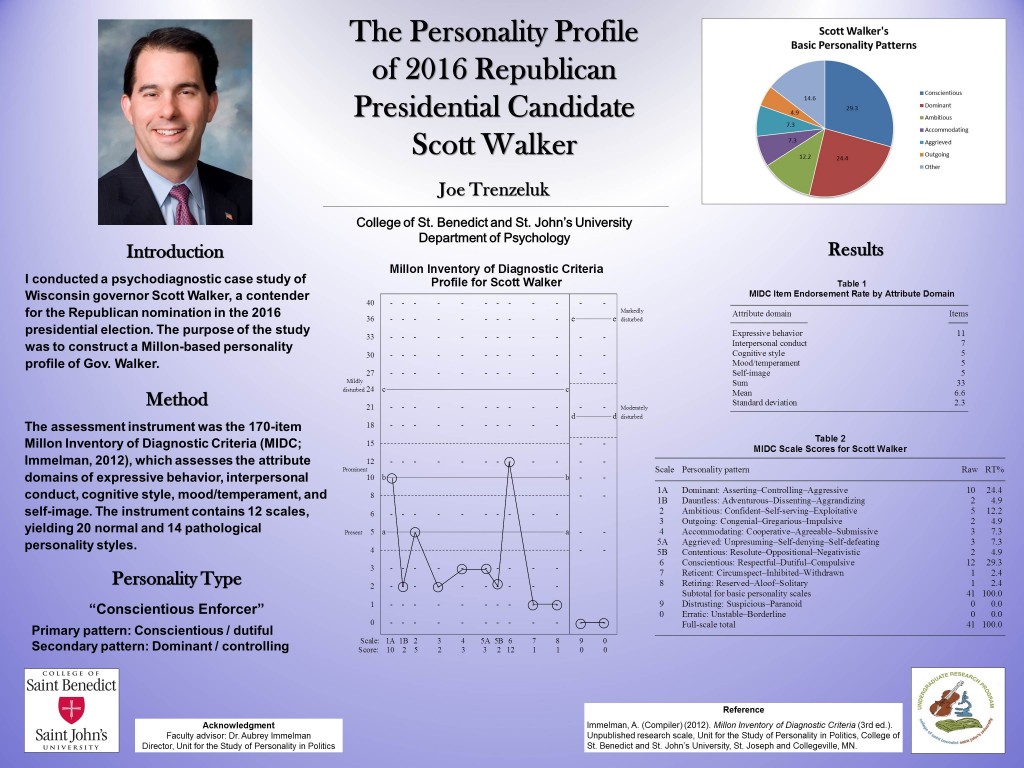
Click on image for larger view
The Personality Profile of 2016 Republican Presidential Candidate Jeb Bush (PEI = -3)
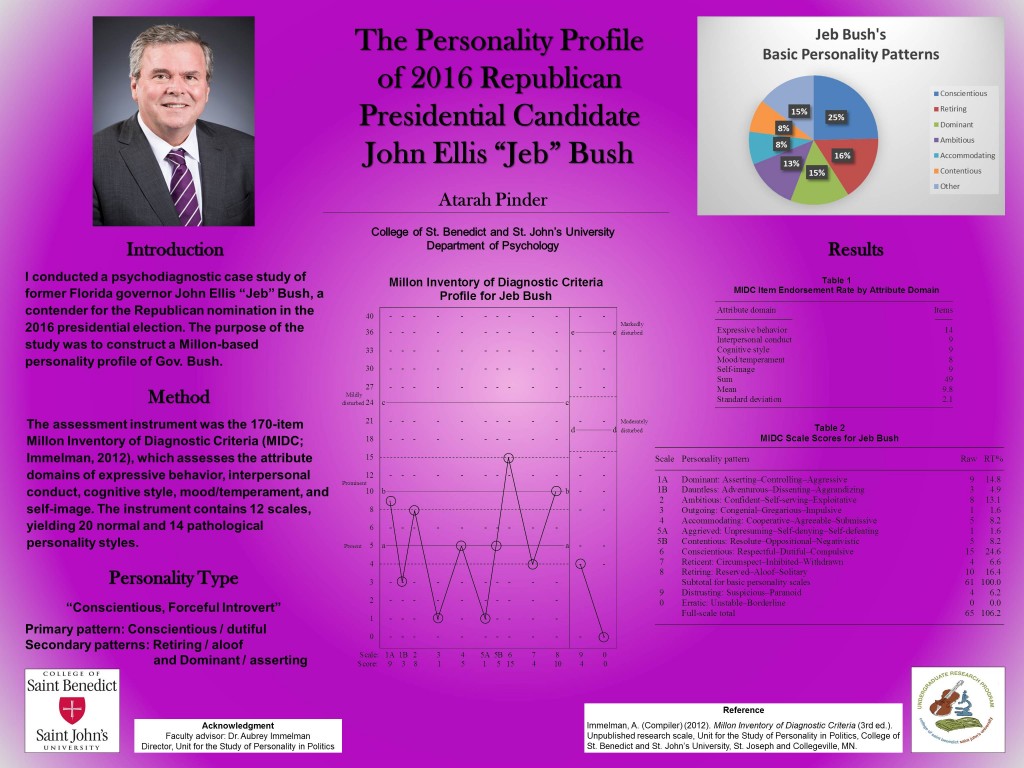
Click on image for larger view
Why Donald Trump Beats Jeb Bush: The Personal Electability Index (Aug. 23, 2015)
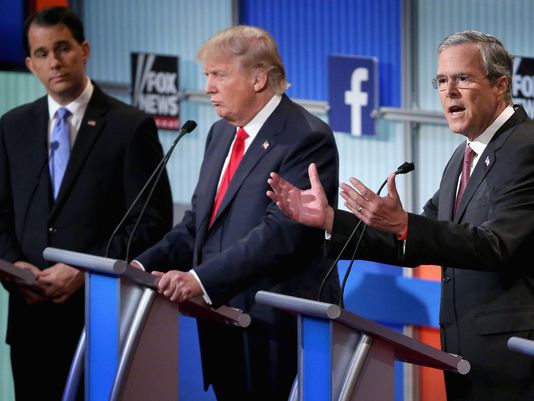
Photo credit: Chip Somodevilla / Getty Images
Why Mitt Romney Won’t Be President — In Theory (Oct. 29, 2012)

Aubrey Immelman and Andrew Obritsch in Chicago at the annual scientific meeting of the International Society of Political Psychology to present their research on Barack Obama and Mitt Romney, July 2012.
Personality Matters: Mitt Romney Has Al Gore Problem (Jan. 16, 2012)
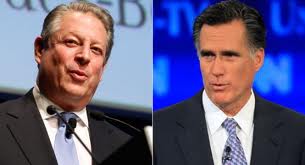
Photo composite: The Moderate Voice
Why Mitt Romney Won’t Win (May 12, 2011)
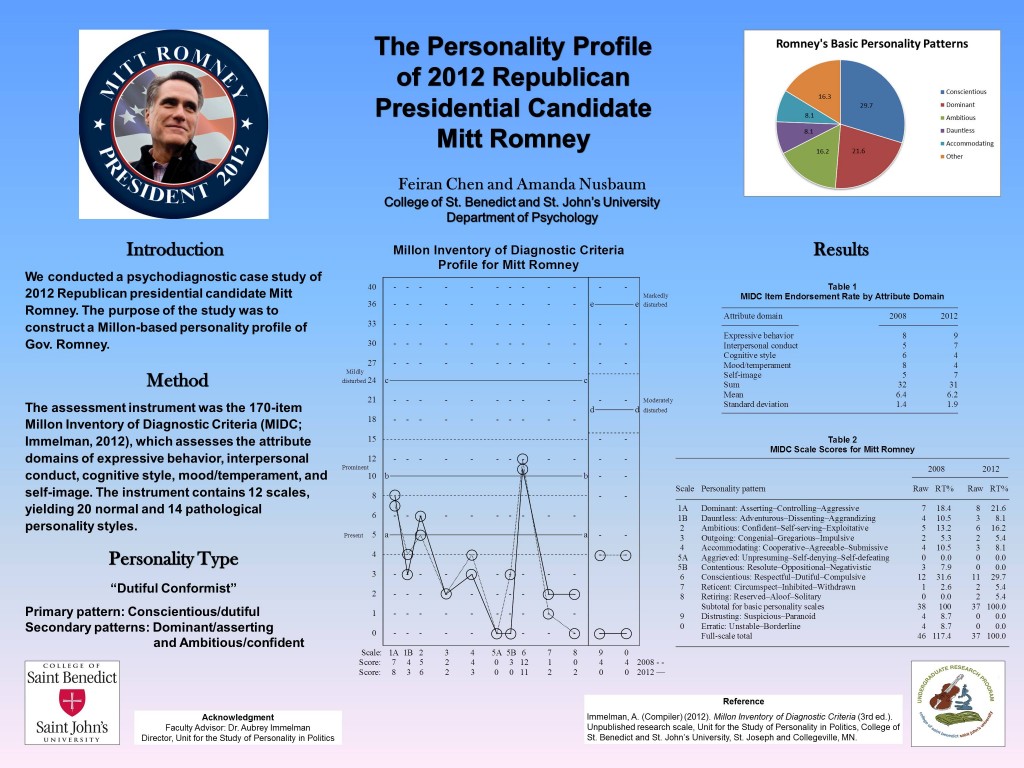
Click on image for larger view
Alternate link to “Projecting the Winner of the 2016 Presidential Election: The Personal Electability Index” at » http://www.immelman.us/news/projecting-the-winner-of-the-2016-presidential-election-the-personal-electability-index/


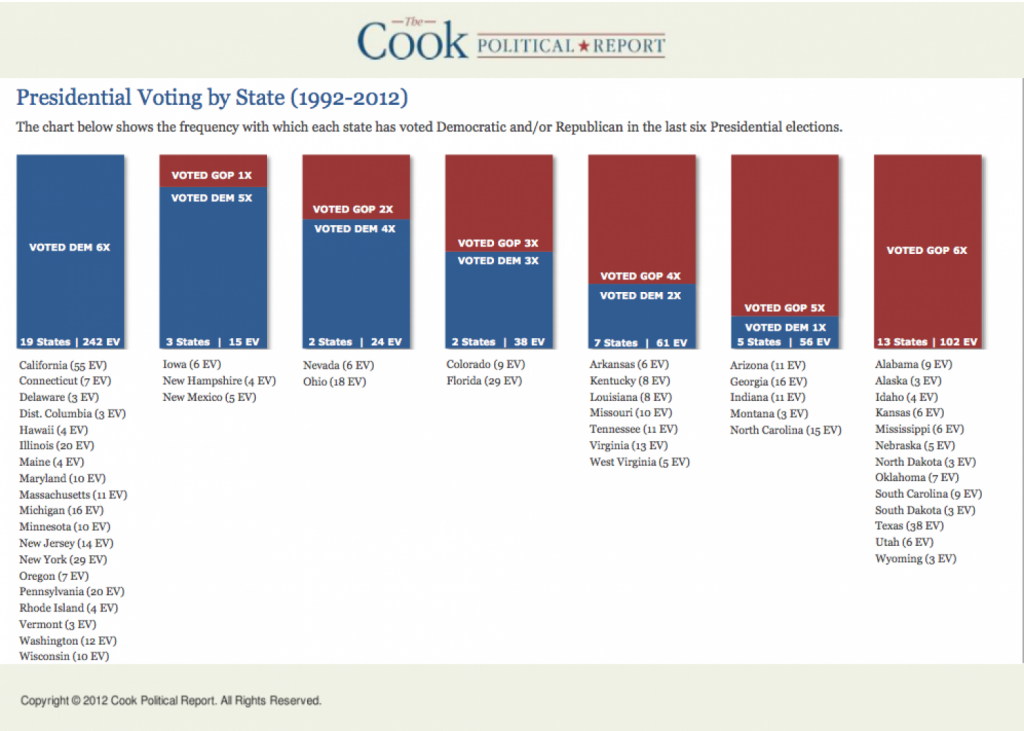

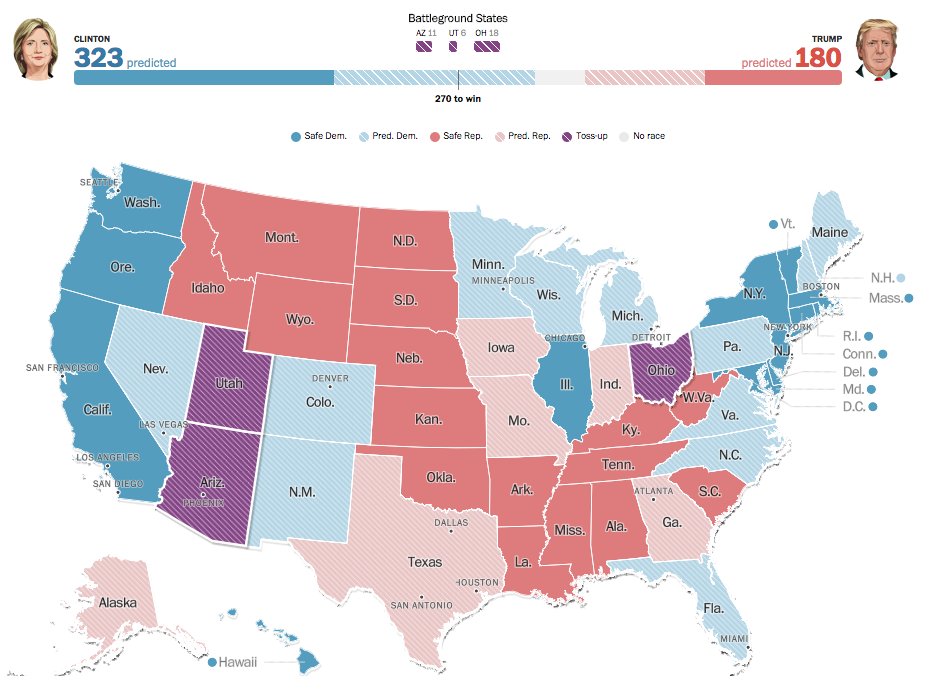
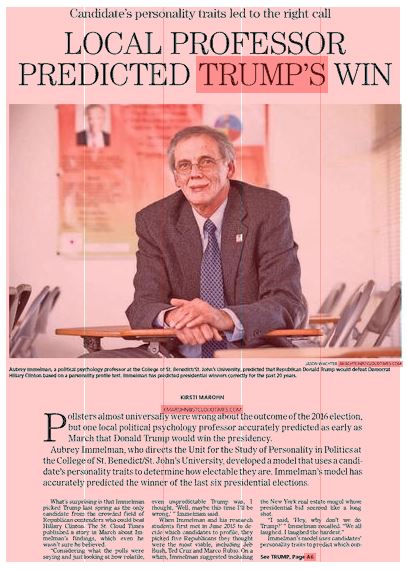









Follow Aubrey Immelman